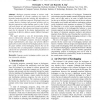Free Online Productivity Tools
i2Speak
i2Symbol
i2OCR
iTex2Img
iWeb2Print
iWeb2Shot
i2Type
iPdf2Split
iPdf2Merge
i2Bopomofo
i2Arabic
i2Style
i2Image
i2PDF
iLatex2Rtf
Sci2ools
110
click to vote
CSREASAM
2010
2010
Keyloggers in Cybersecurity Education
Abstract-- Keylogger programs attempt to retrieve confidential information by covertly capturing user input via keystroke monitoring and then relaying this information to others, often for malicious purposes. Keyloggers thus pose a major threat to business and personal activities such as Internet transactions, online banking, email, or chat. To deal with such threats, not only must users be made aware about this type of malware, but software practitioners and students must also be educated in the design, implementation, and monitoring of effective defenses against different keylogger attacks. This paper presents a case for incorporating keylogging in cybersecurity education. First, the paper provides an overview of keylogger programs, discusses keylogger design, implementation, and usage, and presents effective approaches to detect and prevent keylogging attacks. Second, the paper outlines several keylogging projects that can be incorporated into an undergraduate computing program to e...
| Added | 01 Mar 2011 |
| Updated | 01 Mar 2011 |
| Type | Journal |
| Year | 2010 |
| Where | CSREASAM |
| Authors | Christopher Wood, Rajendra Raj |
Comments (0)

